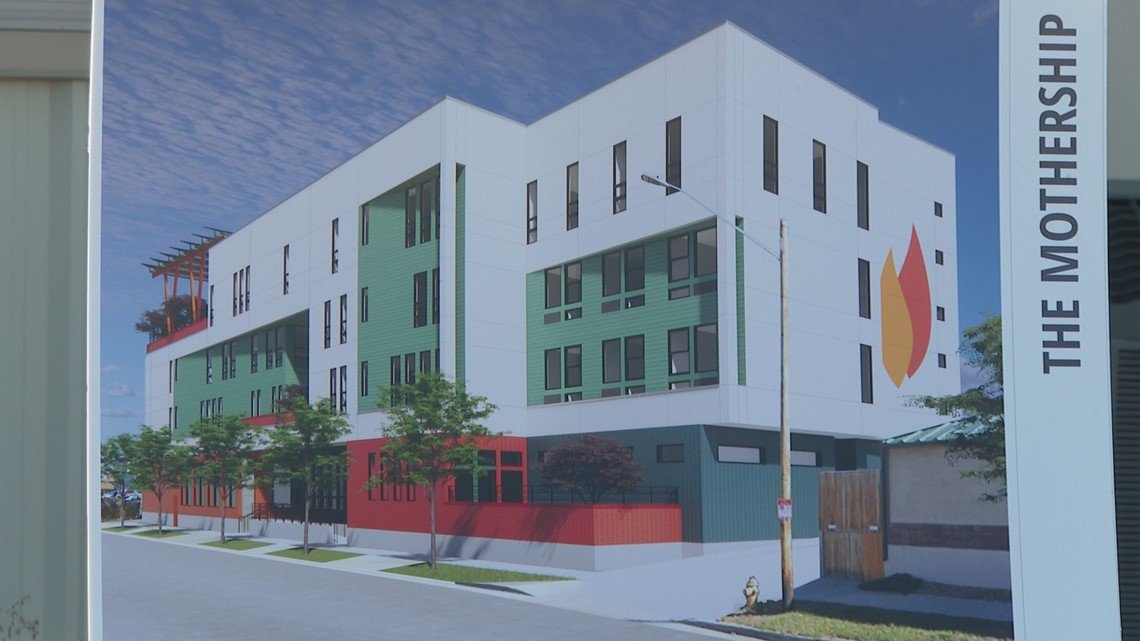Urban Peak plans new shelter for youth experiencing homelessness
Urban Peak opened its youth shelter in south Denver in 1998. U.S. Rep. Diana DeGette helped secure $3 million in funding for a new shelter.
An easy way to measure need is to count the young people Fatima Kiass helps every few minutes at the Urban Peak Drop-In Center.
They streamed in one at a time and in small groups Monday morning. Kiass greeted them all from behind her desk in the lobby.
"Hey, I saw you connected with the DMV!" Kiass said to a young man who entered the lobby. "How'd that go?"
They spoke for a minute before Kiass hit the buzzer to let him inside. Minutes later, a young woman was at her desk. She was hungry. Kiass gave her a sack lunch from the kitchen and a ginger ale.
“This is also the biggest part of my job is multitasking," Kiass said.
Kiass is the supervisor of the Drop-In Center at 2100 Stout Street, a facility that Urban Peak describes as a refuge and safe haven for young people experiencing homelessness.
“The Drop-In Center is a space for people to just come as they are," Kiass said.
The need for services has been growing, Kiass said, like it has for Urban Peak's overnight shelter in south Denver.
On Monday, U.S. Rep. Diana DeGette (D-Colorado) and leaders from Urban Peak announced that federal dollars would help construct a new youth shelter in place of the existing facility at 1630 South Acoma Street.
“Nobody is suffering more in my community than the most vulnerable; people who are experiencing homelessness,” DeGette said. "Every single one of us should have an affordable place to live."
DeGette said she helped secure $3 million in funding for the project through legislation Congress passed last week. The new youth shelter is one of 10 projects DeGette selected that will receive federal dollars.
The youth shelter is expected to cost about $30 million, Urban Peak CEO Christina Carlson said. She described it as a transformational new campus for youth that would offer case management, medical and mental health services, a visual arts center, education and employment services and more.
“Not only will it allow us to provide shelter to more youth, but we are deeply committed that this provides a way for youth to come up and out of this system," Carlson said.
Youth experiencing homelessness are the most vulnerable on the streets, Carlson said.
"Not only is there just significant challenges around human trafficking, but also these young people often come out of the foster care system," she said. "For example, one out of three foster care youth become homeless on the day they turn 18.”
Staff at Urban Peak hope the new facility will help lift young people out of homelessness. People who were just like Fatima Kiass.
“I was living in my car, trying to go to school and work and do it all," Kiass said.
Urban Peak helped her with housing in Denver's Capitol Hill neighborhood and gave her an EcoPass to help her get around.
"Building that foundation created stability in my life where I was then able to just kind of focus on school and more focus on thriving rather than just surviving," she said.
Kiass started volunteering at Urban Peak before working her way up to become a supervisor at the Drop-In Center.
She now gives young people the help she once needed.
Here's a list of the projects that will receive federal funding and descriptions DeGette's team provided:
Urban Peak – $3,000,000 to construct a new shelter for youth experiencing homelessness in the Denver area.
Stay Inn Hotel – $2,000,000 for the City of Denver to purchase a now-vacant 95-room hotel to provide and convert it into more housing for those experiencing homelessness in the area.
Denver’s Montbello FreshLo Project – $1,450,000 for the City and County of Denver to construct 97 units of affordable housing in Montbello as part of the Montbello FreshLo Project.
Center for African American Health – $1,000,000 for the Center for African American Health to renovate its building at 3350 Hudson Street to add offices for mental health consultations, a technology room to provide job-readiness classes, and a teaching kitchen to provide community cooking classes on how to eat healthy.
Colorado Coalition for the Homeless – $2,000,000 to construct a new recuperative care facility where those experiencing homelessness will be able to recover after being discharged from the hospital.
Tepeyac Community Health Clinic – $2,000,000 to expand the Tepeyac Community Health Clinic in Elyria-Swansea to provide additional health care services to residents there.
Denver Health – $1,200,000 for Denver Health’s Center for Addiction Medicine Project that provides training and assistance to psychiatric, substance abuse and mental health facilities in the region.
Jewish Family Service of Colorado – $500,000 for the Jewish Family Service of Colorado to provide vocational training programs to Coloradans disproportionately affected by the pandemic - including people of color, immigrants, refugees, veterans and those with disabilities.
United Way – $100,000 for Mile High United Way’s Bridging the Gap Project that provides critical supportive services to 18-year-olds transitioning out of the child welfare system into independence.
Mi Casa Resource Center – $20,000 for Mi Casa Resource Center to provide low-income residents the education and skills needed to succeed in pursuing higher education and help lift their families out of poverty.

